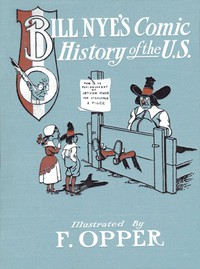Comic History of the United States by Bill Nye (book series for 10 year olds txt) 📗

- Author: Bill Nye
Book online «Comic History of the United States by Bill Nye (book series for 10 year olds txt) 📗». Author Bill Nye
Their sentiment gave place to shouts of battle, and into the silent phalanx a hundred guns poured their red-hot messages of death. The golden grain was drenched with the blood of men no less brave because they were not victorious, and the rich fields of Pennsylvania drank with thirsty eagerness the warm blood of many a Southern son.
Yet they moved onward. Volley after volley of musketry mowed them down, and the puny reaper in the neglected grain gave place to the grim reaper Death, all down that unwavering line of gray and brown.
They marched up to the Union breastworks, bayoneted the gunners at their work, planted their flags on the parapets, and, while the Federals converged from every point to this, exploding powder burned the faces of these contending hosts, who, hand to hand, fought each other to death, while far-away widows and orphans multiplied to mourn through the coming years over this ghastly folly of civil war.
Whole companies of the Confederates rushed as prisoners into the arms of their enemies, and[Pg 282] the shattered remnant of the battered foe retreated from the field.
PRICE OF LIVING RUNNING
UP TO EIGHT HUNDRED AND NINE
HUNDRED DOLLARS PER DAY.
While all this was going on in Pennsylvania, Pemberton was arranging terms of surrender at Vicksburg, and from this date onward the Confederacy began to wobble in its orbit, and the President of this ill-advised but bitterly punished scheme began to wish that he had been in Canada when the war broke out.
In April of the same year Admiral Dupont, an able seaman with massive whiskers, decided to run the fortifications at Charleston with iron-clads, but the Charleston people thought they could run them themselves. So they drove him back after the sinking of the Kennebec and the serious injury of all the other vessels.
General Gillmore then landed with troops. Fort Wagner was captured. The 54th Regiment of colored troops, the finest organized in the Free States, took a prominent part and fought with great coolness and bravery. By December there were fifty thousand colored troops enlisted, and before the war closed over two hundred thousand.
It is needless to say that this made the Yankee unpopular at the time in the best society of the South.
General Gillmore attempted to capture Sumter, and did reduce it to a pulp, but when he went to gather it he was met by a garrison still concealed[Pg 283] in the basement, and peppered with volleys of hot shingle-nails and other bric-à-brac, which forced him to retire with loss.
He said afterward that Fort Sumter was not desirable anyhow.
This closed the most memorable year of the war, with the price of living at the South running up to eight hundred and nine hundred dollars per day, and currency depreciating so rapidly that one's salary had to be advanced every morning in order to keep pace with the price of mule-steaks.[Pg 284]
CHAPTER XXVIII. LAST YEAR OF THE DISAGREEABLE WAR.General Grant was now in command of all the Union troops, and in 1864-5 the plan of operation was to prevent the junction of the Confederates,—General Grant seeking to interest the army in Virginia under General Lee, and General Sherman the army of General Joseph E. Johnston in Georgia.
Sherman started at once, and came upon Johnston located on almost impregnable hills all the way to Atlanta. The battles of Dalton, Resaca, Dallas, Lost Mountain, and Kenesaw Mountain preceded Johnston's retreat to the intrenchments of Atlanta, July 10, Sherman having been on the move since early in May, 1864.
Jefferson Davis, disgusted with Johnston, placed Hood in command, who made three heroic attacks upon the Union troops, but was repulsed. Sherman now gathered fifteen days' rations from the neighbors, and, throwing his forces across Hood's line of supplies, compelled him to evacuate the city.
The historian says that Sherman was entirely[Pg 285] supplied from Nashville via railroad during this trip, but the author knows of his own personal knowledge that there were times when he got his fresh provisions along the road.
GETTING FRESH PROVISIONS ALONG THE ROAD.
This expedition cost the Union army thirty thousand men and the Confederates thirty-five thousand. Besides, Georgia was the Confederacy, so far as arms, grain, etc., were concerned. Sherman attributed much of his success to the fact that he could repair and operate the railroad so rapidly. Among his men were Yankee machinists and engineers, who were as necessary as courageous fighters.[Pg 286]
"We are held here during many priceless hours," said the general, "because the enemy has spoiled this passenger engine. Who knows any thing about repairing an engine?"
"I do," said a dusty tramp in blue. "I can repair this one in an hour."
"What makes you think so?"
"Well, I made it."
This was one of the strong features of Sherman's army. Among the hundred thousand who composed it there were so many active brains and skilled hands that the toot of the engine caught the heels of the last echoing shout of the battle.
Learning that Hood proposed to invade Tennessee, Sherman prepared to march across Georgia to the sea, and if necessary to tramp through the Atlantic States.
Hood was sorry afterwards that he invaded Tennessee. He shut Thomas up in Nashville after a battle with Schofield, and kept the former in-doors for two weeks, when all of a sudden Thomas exclaimed, "Air! air! give me air!" and came out, throwing Hood into headlong flight, when the Union cavalry fell on his rear, followed by the infantry, and the forty thousand Confederates became a scattered and discouraged mob spread out over several counties.
The burning of Atlanta preceded Sherman's march, and, though one of the saddest features of[Pg 287] the war, was believed to be a military necessity. Those who declare war hoping to have a summer's outing thereby may live to regret it for many bitter years.
On November 16, Sherman started, his army moving in four columns, constituting altogether a column of fire by night, and a pillar of cloud and dust by day. Kilpatrick's cavalry scoured the country like a mass meeting of ubiquitous little black Tennessee hornets.
In five weeks Sherman had marched three hundred miles, had destroyed two railroads, had stormed Fort McAllister, and had captured Savannah.
On the 5th and 6th of May, 1864, occurred the battle of the Wilderness, near the old battleground of Chancellorsville. No one could describe it, for it was fought in the dense woods, and the two days of useless butchery with not the slightest signs of civilized warfare sickened both armies, and, with no victory for either, they retired to their intrenchments.
Grant, instead of retreating, however, quietly passed the flank of the Confederates and started for Spottsylvania Court-House, where a battle occurred May 8-12.
Here the two armies fought five days without any advantage to either. It was at this time that Grant sent his celebrated despatch stating that he[Pg 288] "proposed to fight it out on this line if it took all summer."
Finally he sought to turn Lee's right flank. June 8, the battle of Cold Harbor followed this movement. The Union forces were shot down in the mire and brush by Lee's troops, now snugly in out of the wet, behind the Cold Harbor defences. One historian says that in twenty minutes ten thousand Yankee troops were killed; though Badeau, whose accuracy in counting dead has always been perfectly marvellous, admits only seven thousand in all.
Grant now turned his attention towards Petersburg, but Lee was there before him and intrenched, so the Union army had to intrench. This only postponed the evil day, however.
Things now shaped themselves into a siege of Richmond, with Petersburg as the first outpost of the besieged capital.
On the 30th of July, eight thousand pounds of powder were carefully inserted under a Confederate fort and the entire thing hoisted in the air, leaving a huge hole, in which, a few hours afterwards, many a boy in blue met his death, for in the assault which followed the explosion the Union soldiers were mowed down by the concentrated fire of the Confederates. The Federals threw away four thousand lives here.
On the 18th of August the Weldon Railroad[Pg 289] was captured, which was a great advantage to Grant, and, though several efforts were made to recapture it, they were unsuccessful.
PAUSING TO GET LAUNDRY-WORK DONE.
General Early was delegated to threaten Washington and scare the able officers of the army who were stopping there at that time talking politics and abusing Grant. He defeated General Wallace at Monocacy River, and appeared before Fort[Pg 290] Stevens, one of the defences of Washington, July 11. Had he whooped right along instead of pausing a day somewhere to get laundry-work done before entering Washington, he would easily have captured the city.
Reinforcements, however, got there ahead of him, and he had to go back. He sent a force of cavalry into Pennsylvania, where they captured Chambersburg and burned it on failure of the town trustees to pay five hundred thousand dollars ransom.
General Sheridan was placed in charge of the troops here, and defeated Early at Winchester, riding twenty miles in twenty minutes, as per poem. At Fisher's Hill he was also victorious. He devastated the Valley of the Shenandoah to such a degree that a crow passing the entire length of the valley had to carry his dinner with him.
It was, however, at the battle of Cedar Creek that Sheridan was twenty miles away, according to historical prose. Why he was twenty miles away, various and conflicting reasons are given, but on his good horse Rienzi he arrived in time to turn defeat and rout into victory and hilarity.
Rienzi, after the war, died in eleven States. He was a black horse, with a saddle-gall and a flashing eye.
He passed away at his home in Chicago at last[Pg 291] in poverty while waiting for a pension applied for on the grounds of founder and lampers brought on by eating too heartily after the battle and while warm, but in the line of duty.
The Red River campaign under General Banks was a joint naval and land expedition, resulting in the capture of Fort de Russy, March 14, after which, April 8, the troops marching towards Shreveport in very open order, single file or holding one another's hands and singing "John Brown's Body," were attacked by General Dick Taylor, and if Washington had not been so far away and through a hostile country, Bull Run would have had another rival. But the boys rallied, and next day repulsed the Confederates, after which they returned to New Orleans, where board was more reasonable. General Banks obtained quite a relief at this time: he was relieved of his command.
August 5, Commodore Farragut captured Mobile, after a neat and attractive naval fight, and on the 24th and 25th of December Commodore Porter and General Butler started out to take Fort Fisher. After two days' bombardment, Butler decided that there were other forts to be had on better terms, and returned. Afterwards General Terry commanded the second expedition, Porter having remained on hand with his vessels to assist. January 15, 1865, the most heroic fight[Pg 292]ing on both sides resulted, and at last, completely hemmed in, the brave and battered garrison surrendered;





Comments (0)